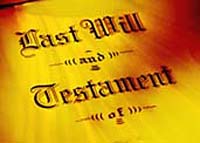 You might be surprised to learn that your elderly or aging parents are more open to discussing their final wishes and estate planning than you, their adult child. If they have already begun the estate planning process, they have come to terms with their own mortality—or are in the process of doing so. Having these discussions with your parents in advance will provide you with practical information. They will take comfort in knowing that you are prepared for the future.
You might be surprised to learn that your elderly or aging parents are more open to discussing their final wishes and estate planning than you, their adult child. If they have already begun the estate planning process, they have come to terms with their own mortality—or are in the process of doing so. Having these discussions with your parents in advance will provide you with practical information. They will take comfort in knowing that you are prepared for the future.
You will be very appreciative after they pass away for the opportunity you had to ask them the questions that will help you to understand their estate and their wishes.
The Huffington Post's recent article, "What Your Aging Parent Isn't Telling You – I Want to Discuss End-of-Life Issues," offers three tips to help you decide whether it's the right time to discuss end-of-life issues with your parent:
 Houston Estate Planning and Elder Law Attorney Blog
Houston Estate Planning and Elder Law Attorney Blog










